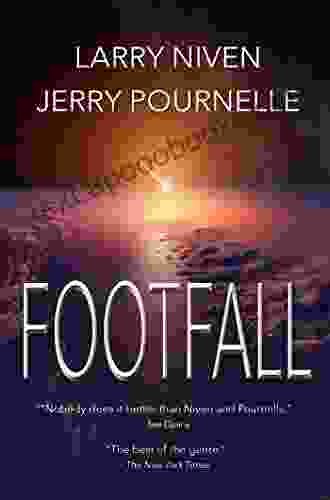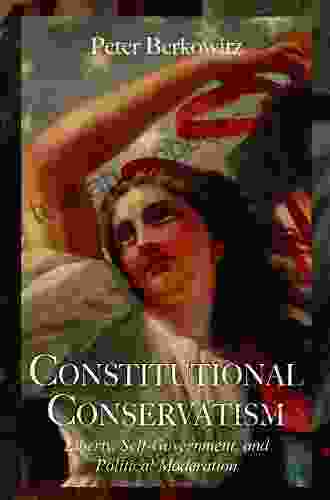Constitutional Conservatism: A Cornerstone of American Liberty and Prosperity

In the realm of political thought, Constitutional Conservatism stands as a beacon of stability and adherence to fundamental principles. This ideology has shaped the foundation of the United States and continues to guide its governance, ensuring the preservation of individual liberty, limited government, and the rule of law.
This guide delves into the intricate web of Constitutional Conservatism, unraveling its core tenets, tracing its historical evolution, and examining its practical applications in the modern world. By understanding this philosophy, we gain a deeper appreciation for the delicate balance of powers that upholds our society and safeguards our freedoms.
4.2 out of 5
| Language | : | English |
| File size | : | 371 KB |
| Text-to-Speech | : | Enabled |
| Screen Reader | : | Supported |
| Enhanced typesetting | : | Enabled |
| Word Wise | : | Enabled |
| Print length | : | 146 pages |
| Lending | : | Enabled |
Key Principles
- Limited Government: Constitutional Conservatism advocates for a government that exercises its authority within strictly defined boundaries, respecting the inherent rights and liberties of individuals.
- Individual Liberty: This principle places the individual at the forefront, recognizing their fundamental rights and freedoms as inviolable and protected from government overreach.
- Rule of Law: Constitutional Conservatism upholds the supremacy of the law, ensuring that all individuals, including government officials, are subject to its impartial application.
- Separation of Powers: This principle divides governmental authority among distinct branches (executive, legislative, and judicial),preventing the concentration of power in any single entity.
- Checks and Balances: Each branch of government possesses the ability to restrain the powers of the others, creating a system of mutual accountability.
- Federalism: Constitutional Conservatism supports a federal system of government, where power is shared between a central authority and constituent states, ensuring greater local autonomy and preventing excessive centralization.
- Judicial Restraint: This principle advocates for judges to exercise self-restraint in interpreting the Constitution, deferring to the original intent of its framers and avoiding judicial activism.
- Originalism: Constitutional Conservatism emphasizes the importance of interpreting the Constitution based on its original meaning and intent, as understood by its authors and ratified by the people.
- Textualism: This approach to constitutional interpretation focuses on the plain text of the Constitution, avoiding reliance on external sources or subjective preferences.
Historical Foundations
The roots of Constitutional Conservatism can be traced back to the Enlightenment era, with its emphasis on individual rights, limited government, and the rule of law. These ideas were crystallized in the works of philosophers such as John Locke and Montesquieu.
In the United States, Constitutional Conservatism emerged as a distinct political philosophy during the late 18th and early 19th centuries. The Founding Fathers, influenced by Enlightenment principles, crafted a Constitution that embodied these ideals.
Throughout American history, Constitutional Conservatism has played a pivotal role in shaping the nation's political and legal landscape. From the debates over judicial review to the Civil War and beyond, this ideology has been a constant force in safeguarding American liberties.
Contemporary Applications
In the 21st century, Constitutional Conservatism remains a vibrant and influential force in American politics and jurisprudence. Its principles continue to guide decision-making at all levels of government, ensuring the protection of individual rights and the preservation of a free and prosperous society.
Contemporary issues such as healthcare, education, and environmental protection are often examined through a Constitutional Conservative lens, balancing the role of government with the rights of individuals.
Furthermore, Constitutional Conservatism has gained international recognition as a model for constitutional governance, inspiring other nations to adopt similar principles.
Constitutional Conservatism is a powerful ideology that has had a profound impact on American society and beyond. Its principles of limited government, individual liberty, and the rule of law have served as a beacon of stability and prosperity for centuries.
Understanding the tenets of Constitutional Conservatism is essential for navigating the complexities of modern governance and ensuring the preservation of our cherished freedoms. This guide provides a comprehensive overview of this enduring philosophy, empowering us to appreciate its significance and its continued relevance in shaping the future of our nation.
4.2 out of 5
| Language | : | English |
| File size | : | 371 KB |
| Text-to-Speech | : | Enabled |
| Screen Reader | : | Supported |
| Enhanced typesetting | : | Enabled |
| Word Wise | : | Enabled |
| Print length | : | 146 pages |
| Lending | : | Enabled |
Do you want to contribute by writing guest posts on this blog?
Please contact us and send us a resume of previous articles that you have written.
 Book
Book Novel
Novel Page
Page Chapter
Chapter Text
Text Story
Story Genre
Genre Reader
Reader Library
Library Paperback
Paperback E-book
E-book Magazine
Magazine Newspaper
Newspaper Paragraph
Paragraph Sentence
Sentence Bookmark
Bookmark Shelf
Shelf Glossary
Glossary Bibliography
Bibliography Foreword
Foreword Preface
Preface Synopsis
Synopsis Annotation
Annotation Footnote
Footnote Manuscript
Manuscript Scroll
Scroll Codex
Codex Tome
Tome Bestseller
Bestseller Classics
Classics Library card
Library card Narrative
Narrative Biography
Biography Autobiography
Autobiography Memoir
Memoir Reference
Reference Encyclopedia
Encyclopedia Kola Boof
Kola Boof Neil Astley
Neil Astley Lillian S Weiss
Lillian S Weiss Samuel Beckett
Samuel Beckett Kristy Cambron
Kristy Cambron Nancy Mcgovern
Nancy Mcgovern Kirstin Chen
Kirstin Chen Kristin Nicholas
Kristin Nicholas Mr Anil Rachamalla
Mr Anil Rachamalla Samantha Belanger
Samantha Belanger Silvia Nakkach
Silvia Nakkach Susan Gillis
Susan Gillis Lorrie Paper
Lorrie Paper Kristina J Jordan
Kristina J Jordan Lucile Wilson
Lucile Wilson Stephen Fink
Stephen Fink Linda Francis Lee
Linda Francis Lee Simon Chan
Simon Chan Zygmunt Bauman
Zygmunt Bauman Stephen Baines
Stephen Baines
Light bulbAdvertise smarter! Our strategic ad space ensures maximum exposure. Reserve your spot today!
 Haruki MurakamiFollow ·7k
Haruki MurakamiFollow ·7k Pablo NerudaFollow ·12.5k
Pablo NerudaFollow ·12.5k Charles ReedFollow ·15.1k
Charles ReedFollow ·15.1k John KeatsFollow ·5.1k
John KeatsFollow ·5.1k Dwight BlairFollow ·17.6k
Dwight BlairFollow ·17.6k H.G. WellsFollow ·12.7k
H.G. WellsFollow ·12.7k Mike HayesFollow ·4.2k
Mike HayesFollow ·4.2k Billy PetersonFollow ·9.6k
Billy PetersonFollow ·9.6k

 Henry Wadsworth Longfellow
Henry Wadsworth LongfellowUnleash the Blues Spirit: Dive into "Blues Guitar Songs...
The captivating allure of the blues has...

 Ernesto Sabato
Ernesto SabatoBehind the Scenes with the Legends of Beauty
Unveiling the...

 Neal Ward
Neal WardUnleash the Infernal Power of "Lucifer's Hammer" by Larry...
A Cosmic Catastrophe that Will Ignite Your...

 Wesley Reed
Wesley ReedPetra Pecado: A Gripping and Unforgettable Journey...
Embark on a Captivating Adventure ...

 Phil Foster
Phil FosterStep into a World of Wonders: Footfall by Larry Niven - A...
Prologue: In the vast expanse of the...
4.2 out of 5
| Language | : | English |
| File size | : | 371 KB |
| Text-to-Speech | : | Enabled |
| Screen Reader | : | Supported |
| Enhanced typesetting | : | Enabled |
| Word Wise | : | Enabled |
| Print length | : | 146 pages |
| Lending | : | Enabled |














